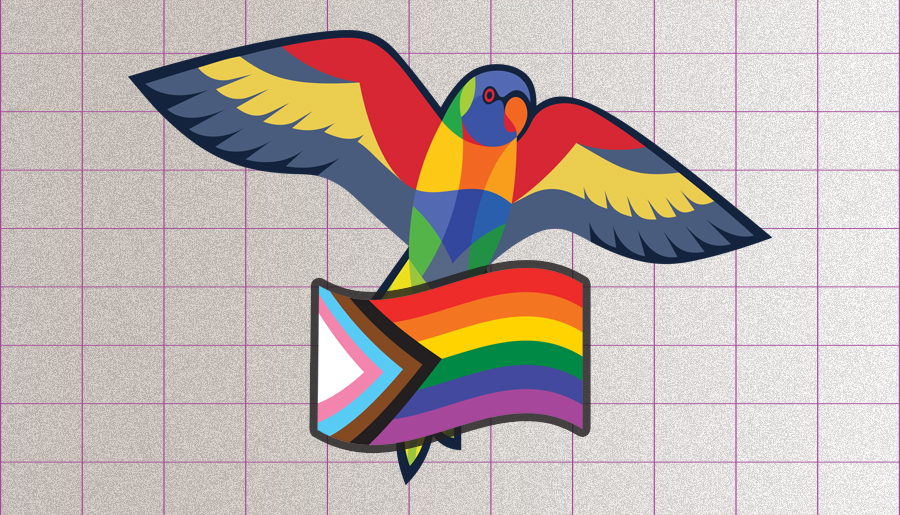Warning: This article deals with the topic of targeted violence against a LGBTQIA+ people and may be triggering for some readers. This article also deals with mental health, suicide , and self-harm and may be triggering for some readers.
Unfortunately, 2023 isn’t the utopian future we’re fighting for. We don’t have free trains that can fly. Video Ezy hasn’t made a comeback. And most importantly, LGBTQIA+ people don’t have the same equal rights as the rest of the neighbourhood.
However, just because we haven’t yet hit peak Australia doesn’t mean we shouldn’t fight for it. It’s vital to know what issues are hurting LGBTQIA+ people and then advocate for change with everything we got.
Which brings us to Janine Middleton AM. For six solid years, Middleton was the Co-Chair plus CEO of Australian Marriage Equality, an organisation which helped legalise same-sex marriage. And in 2023, Middleton is on the board of Out For Australia (OFA), an organisation that provides mentors for young LGBTQIA+ folks.
Moreover, as a part of Sydney’s 2023 WorldPride celebrations, the Queen Victoria Building was officially renamed after five Aussie queens that have greatly supported the LGBTQIA+ community. One of these queens being Middleton.
Therefore, if anyone can unpack the biggest issues that the LGBTQIA+ community is up against, it’s this tactician right here.
And fortunately for us, Middleton did exactly that. Middleton had a chat with The Latch that detailed a bunch of ways LGBTQIA+ people are getting screwed by the system. What’s more, she explained how we can all be advocates for change.
So, without further ado, let’s get into the details.
LGBTQIA+ and the Workplace
Okay, here’s a wild fact: 50% LGBTQIA+ people of still hide their identity at work. Yup, that’s right, 50% of these folks are closeted.
“It is unbelievable,” said Middleton. “And most people when I tell them that are quite shocked.”
“I think there’s a lot of things at play here. I think that COVID and working from home have exacerbated the situation. Young people are coming out of a university, starting a new job, and working at home remotely. It’s not very easy to come out at work on a Zoom call.”
Moreover, this problem isn’t just bad for LGBTQIA+ people, it’s bad for businesses. This is because if a great employee doesn’t feel like they can be themselves at their workplace, they might just bounce.
Middleton said, “If a young person comes into an interview and they don’t feel they can be themselves, if they get the job, they won’t come out. And that person could take years, could take five, six, seven years until they feel confident enough to come out. And they’re more likely to switch and go somewhere else and start afresh.”
LGBTQIA+ and Homophobia
Unfortunately, another reason LGBTQIA+ people are closeted at work is because of homophobia. For instance, it would be dangerous to talk about your identity in some regional Australian companies.
“When you go further out into the country, if you go into different industries, construction, for example, it’s not as welcoming,” said Middleton.
This is such a problem that Middleton has heard multiple stories of LGBTQIA+ people moving from a company’s city branch to a regional branch and then no longer being safe. These folks are forced back into the closet.
“It is devastating,” said Middleton. “So even in the one company, it’s not universal.”
So, how do we solve this problem? Whelp, we have to keep emphasising to employers that LGBTQIA+ rights matter and that there’s more work to be done.
As Middleton said, “I feel after we won marriage equality, during marriage equality, a lot of corporates set up an internal pride group. And then what I heard a lot of after that was, ‘Oh, well you’ve got marriage quality now. There’s nothing more to do. You don’t need your group anymore.’ And as we always said on the campaign, when we achieve marriage equality, we are just at the beginning of the next race.”
“There’s so much more to be done.”
LGBTQIA+ and Mental Health Issues
At the moment, there’s just not enough support for LGBTQIA+ people who struggle with their mental health. This leads to some individuals harming themselves or worse.
“Mental health issues are still a huge problem,” said Middleton. “I went to a funeral earlier this week of one of my friends who was a bi man who took his own life.”
“These are real issues, this has to be funded by the government. We know that there are high suicide rates across the community. When you get into the trans community, it’s significantly higher. We can see all these stats from the ABS.”
Related: What LGBTQIA+ Rights Are Like in Australia
Related: Will NSW Ban Gay Conversion Therapy in 2023?
LGBTQIA+ and Homelessness
In 2023, LGBTQIA+ kids are being kicked from their homes because of their identities. This is an abhorrent shame.
As Middleton said, “A lot of kids are still thrown out of home. I find it beyond belief actually, that someone can’t accept their child because of their gender identification or their sexuality. But it happens all the time.”
“Charities like the Pinnacle Foundation, which I used to be the CEO of before I joined OFA, are giving out scholarships to disadvantaged youths. And these scholarships are largely for young people that have been thrown out of home.”
LGBTQIA+ and Storytelling
Tragically, not everyone is a fan of supporting LGBTQIA+ people. What’s more, it would be much easier to change Australia for the better if these people were on the right side.
When talking with such individuals, Middleton is an advocate for storytelling. She believes that compelling narratives are an effective way of getting straight people to care about LGBTQIA+ challenges.
“Storytelling is really impactful,” said Middleton.
“Just having a panel where, or it can all be done online or whatever, where people just talk about their stories, and then the people around them can understand. Because it’s not just a person that might be from the community which may understand them, it’s their parents, it’s their siblings.”
LGBTQIA+ and Honesty
Another way you can advocate for LGBTQIA+ issues is by just continually talking about them. Don’t let these issues slip into obscurity.
“People just need to make sure when they do their corporate surveys or whatever, they state that diversity, all kinds of diversity, is important to them. And then when they do have a day of remembrance in the calendar, that it’s not just a cupcake. It is something that is meaningful. So people know when they come to work that they can be themselves.”
If this article brings up any issues for you or anyone you know, or you are experiencing suicidal ideation or are at risk, please contact Lifeline (13 11 14), Kids Helpline (1800 55 1800) or Beyond Blue (1300 22 4636), all of which provide trained counsellors you can talk with 24/7. If you are in immediate danger, call 000.
If this article brings up any issues for you or anyone you know, or if you or a young person you know is struggling with symptoms of mental illness, please contact Headspace (1800 650 890) or chat online. If you are over the age of 25 and suffering from symptoms of mental illness, please contact your local GP for a Mental Health Assessment Plan or call Lifeline (13 11 14) or Kids Helpline (1800 55 1800), both of which provide trained counsellors you can talk with 24/7.
Read more stories from The Latch and subscribe to our email newsletter.







